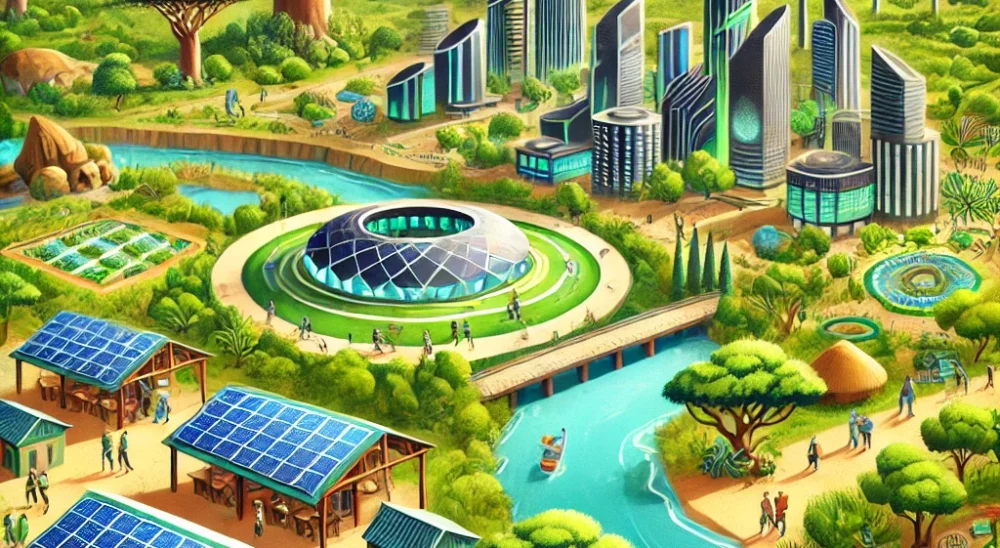
AI image
by Meli M. Ncube
Sustainability involves caring for the environment, society, and the economy. Attending the Discourses of Sustainable Transitions summer school, hosted by Stellenbosch University in partnership with the University of Groningen, deepened my understanding of how language shapes our views and actions on sustainability. The program provided valuable insights into the interplay between language, beliefs, and practices, particularly in the context of equitable sustainability transitions.
Understanding the Power of Discourse
One of the key themes of the program was the materiality of discourse. I learned how the language used by public figures, including politicians, activists, journalists, and academics, reveals underlying assumptions and values. These discourses shape beliefs about what is wrong, what needs to change, and how to act appropriately in the present moment. By examining these discourses, I gained a deeper understanding of how language influences material culture and societal practices.
The program emphasized the importance of paying attention to discourse in the struggle to save the planet. For instance, how can an organic farmer committed to decolonial ecological values secure agricultural grants without resorting to capitalistic rhetoric? This question highlighted the need for effective communication that aligns with underlying values while advocating for sustainable practices.
Methodological Approaches
The summer school incorporated various methodological approaches to study sustainability transitions. We engaged in theoretically driven discussion sessions, methodology workshops, and field trips. These activities provided hands-on opportunities to explore different discourses and their impact on sustainability practices.
One of the methodological workshops focused on agile design thinking. This approach was used for collective problem-solving and helped me develop powerful communicative platforms. By working with societal stakeholders, I learned to create rhetoric that is both effective and aligned with their values.
Another workshop introduced futures thinking, which involved envisioning transformative futures and informing decision-making processes. Through interactive exercises and real-world case studies, we explored tools and techniques to create alternative discourses for diverse futures. This approach offered valuable insights into harnessing futures thinking for more sustainable and adaptive outcomes.
Discourses of Water and Food Systems
The program explored specific discourses around water and food systems. We examined how human relationships with water have evolved discursively. We explored the colonial, modern discourse of water as a resource to be captured and managed versus indigenous or decolonial discourses that recognize water as a living entity with which we share the planet. This exploration was complemented by a walking seminar along the Eerste Rivier, where we discussed these discourses in a real-world context.
Similarly, the program addressed discourses around food systems and agriculture. We investigated how human relationships with food and farming have evolved discursively. This included examining the impact of different discourses on food systems and exploring sustainable agricultural practices.
Learning Outcomes
By the end of the program, we achieved several learning outcomes. Personally, I was able to identify and recognize the relationship between worldviews and discourse in discussions around sustainability. This included articulating the material impact of these discursive practices on society.
I also learned to design transformative transdisciplinary research processes for knowledge co-creation. This involved collaborating with researchers and practitioners from different disciplines and from outside academia to develop sustainability projects. Additionally, I practiced agile design thinking and futures thinking during these transformative research processes.
The Future of Sustainability Transitions
The insights gained from the summer school highlighted the critical role of discourse in shaping sustainable futures. As we move forward, it is essential to continue exploring and challenging dominant discourses that hinder sustainability efforts. By fostering inclusive and diverse discourses, we can create more equitable and just sustainability transitions.
The future of sustainability transitions lies in our ability to communicate effectively and align our actions with our values. This requires ongoing collaboration between academia, practitioners, and societal stakeholders. By leveraging methodological approaches like agile design thinking and futures thinking, we can envision and create transformative futures that prioritize sustainability.



